葬花吟 英文
英语诗歌大全 :葬花吟
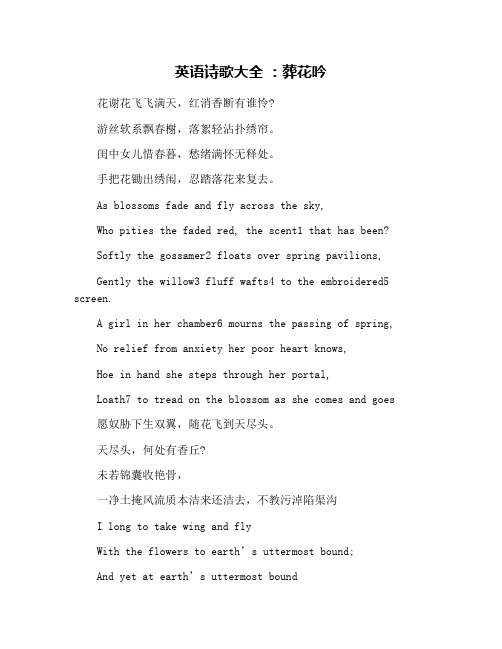
英语诗歌大全:葬花吟花谢花飞飞满天,红消香断有谁怜?游丝软系飘春榭,落絮轻沾扑绣帘。
闺中女儿惜春暮,愁绪满怀无释处。
手把花锄出绣闱,忍踏落花来复去。
As blossoms fade and fly across the sky,Who pities the faded red, the scent1 that has been?Softly the gossamer2 floats over spring pavilions,Gently the willow3 fluff wafts4 to the embroidered5 screen.A girl in her chamber6 mourns the passing of spring,No relief from anxiety her poor heart knows,Hoe in hand she steps through her portal,Loath7 to tread on the blossom as she comes and goes愿奴胁下生双翼,随花飞到天尽头。
天尽头,何处有香丘?未若锦囊收艳骨,一净土掩风流质本洁来还洁去,不教污淖陷渠沟I long to take wing and flyWith the flowers to earth’s uttermost bound;And yet at earth’s uttermost boundWhere can a fragrant8 burial mound9 be found? Better shroud10 the fair petals11 in silkWith clean earth for their outer attire;For pure you came and pure shall go,Not sinking into some foul12 ditch or mire13.柳丝榆荚自芳菲,不管桃飘与李飞。
《葬花吟》中英文对照

《葬花吟》中英文对照《葬花吟》英文版Flowers fade and fly,and flying fill the sky;Their bloom departs, their perfume gone,yet who stands pitying by?And wandering threads of gossameron the summer-house are seen,And falling catkins lightly dew-steepedstrike the embroidered screen.A girl within the inner rooms,I mourn that spring is done,A veil of sorrow binds my heart,and solace there is none.I pass into the garden,and I turn to use my hoe,Treading over fallen gloriesas I lightly come and go.There are willow-sprays and flowers of elm,and these have scent enough.I care not if the peach and plum,are stripped from every bough.The peach-tree and the plum-tree toonext year may bloom again,But next year, in the inner rooms,tell me, shall I remain?By the third moon new fragrant nestsshall see the light of day,New swallows fly among the beams,each on its thoughtless way.Next year once more they'll seek their food among the painted flowers,But I may go, and beams may go,and with them swallow bowers.Three hundred days and sixty makea year, and therein lurkDaggers of wind and swords of frostto do their cruel work.How long will last the fair fresh flower which bright and brighter glows?One morning its petals float away,but to where no-one knows.Gay bloooming buds attract the eye,faded they're lost to sight;Oh, let me sadly bury thembeside these steps tonight.Alone, unseen, I seize my hoe,with many a bitter tear;They fall upon the naked stemand stains of blood appear.The night-jar now has ceased to mourn, the dawn comes on apace,I seize my hoe and close the gates, leaving the burying-place;But not until sunbeams dot the walldoes slumber soothe my care,The cold rain pattering on the paneas I lie shivering there.You wonder that with flowing tearsmy youthful cheek is wet;They partly rise from angry thoughts,and partly from regret.Regret that spring comes suddenly;and anger that it cannot last.No sound to announce its approach,or warn us when it's passed.Last night within the gardensad songs were faintly heard,Sung, as I knew, by spirits,spirits of flower and bird.We cannot keep them here with us,these much-loved birds and flowers,They sing but for a season's space,and bloom a few short hours.If only I on a feathered wingmight soar aloft and fly,With flower spirits I would seekthe rooms within the sky.But high in the airWhat grave is there?No, give me an embroidered bagwithin to lay their charms,And Mother Earth, pure Mother Earth,shall hide them in her arms.Thus those sweet forms which spotless came shall spotless go again,Nor pass dirty with mud and filthalong some filthy drain.Farewell, dear flowes, forever now, thus buried as was best,I have not yet divined when Iwith you shall sink to rest.I who can bury flowers like thisa laughing-stock shall be;I cannot say in days to comewhat hands shall bury me.See how when spring begins to fail each opening flower fades;So too there is a time of ageand death for beautiful maids;And when the fleeting spring is gone, and days of beauty over,Flowers fall, and lovely maidens die, and both are known no more.葬花吟花谢花飞飞满天,红消香断有谁怜?游丝软系飘春榭,落絮轻粘扑绣帘。
高中英语 Song of the Burial of Flowers葬花吟阅读素材

Song of the Buria of Fower葬花吟Fower fade and fa and f about u in the ,But who itie the o of our fragrance when ou die?花谢花飞飞满天,红绡香断有谁怜?Lie goamer ou foat and and on boudoir I igh over the coe of orrowfu feeing 闺中女儿惜春暮,愁绪满怀无处诉。
S under m fine curtain,To and fro on faen eta, how can I bear treading?手把花锄出绣帘,忍踏落花来复去。
Wiow twig and em bud end weet cent a the ma,Who care when eta are in deca?柳丝榆荚自芳菲,不管桃飘与李飞。
Net ear tree wi be in boom again,But who wi be the mater of m boudoir then?桃李明年能再发,明岁闺中知是谁In March unar waow have got their net read,The on the beam eem to be thoe without merc三月香巢初垒成,梁间燕子太无情!Net ear in their fight, freh fower the ma e ient and go without eaving a trace 怜春忽至恼忽去,至又无语去不闻。
Lat night beond ed riing,Wa it the ou of fower or bird that were inging?昨宵庭外悲歌奏,知是花魂与鸟魂It i awa hard to a their ou to ta behind,That bird are ient and fower fee ahamed, I find花魂鸟魂总难留,鸟自无语花自羞。
葬花一吟葬香魂_译诗三种异情韵_葬花吟_三种英译文比较赏析
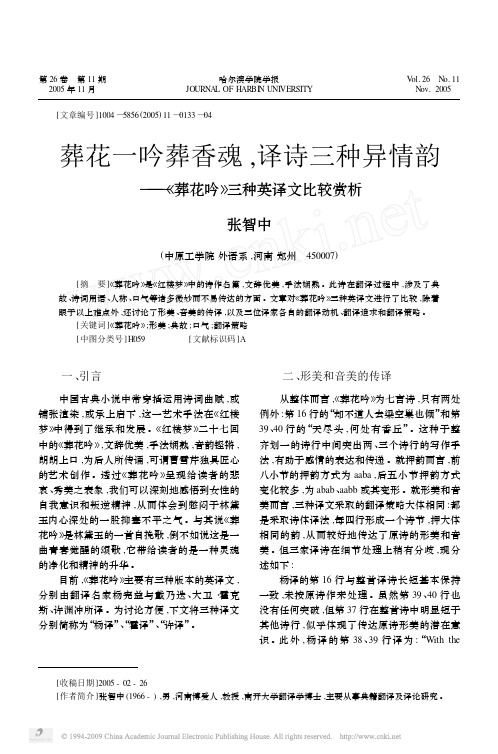
[收稿日期]2005-02-26 [作者简介]张智中(1966-),男,河南博爱人,教授,南开大学翻译学博士,主要从事典籍翻译及译论研究。
第26卷 第11期2005年11月哈尔滨学院学报JOURNA L OF H AR BI N UNI VERSITY V ol.26 N o.11N ov.2005 [文章编号]1004—5856(2005)11—0133—04葬花一吟葬香魂,译诗三种异情韵———《葬花吟》三种英译文比较赏析张智中(中原工学院外语系,河南郑州 450007)[摘 要]《葬花吟》是《红楼梦》中的诗作名篇,文辞优美,手法娴熟。
此诗在翻译过程中,涉及了典故、诗词用语、人称、口气等诸多微妙而不易传达的方面。
文章对《葬花吟》三种英译文进行了比较,除着眼于以上难点外,还讨论了形美、音美的传译,以及三位译家各自的翻译动机、翻译追求和翻译策略。
[关键词]《葬花吟》;形美;典故;口气;翻译策略[中图分类号]H059 [文献标识码]A 一、引言 中国古典小说中常穿插运用诗词曲赋,或铺张渲染,或承上启下,这一艺术手法在《红楼梦》中得到了继承和发展。
《红楼梦》二十七回中的《葬花吟》,文辞优美,手法娴熟,音韵铿锵,朗朗上口,为后人所传诵,可谓曹雪芹独具匠心的艺术创作。
透过《葬花吟》呈现给读者的悲哀、秀美之表象,我们可以深刻地感悟到女性的自我意识和叛逆精神,从而体会到憋闷于林黛玉内心深处的一股抑塞不平之气。
与其说《葬花吟》是林黛玉的一首自挽歌,倒不如说这是一曲青春觉醒的颂歌,它带给读者的是一种灵魂的净化和精神的升华。
目前,《葬花吟》主要有三种版本的英译文,分别由翻译名家杨宪益与戴乃迭、大卫・霍克斯、许渊冲所译。
为讨论方便,下文将三种译文分别简称为“杨译”、“霍译”、“许译”。
二、形美和音美的传译 从整体而言,《葬花吟》为七言诗,只有两处例外:第16行的“却不道人去梁空巢也倾”和第39、40行的“天尽头,何处有香丘”。
《葬花吟》译文对比赏析

《葬花吟》译文对比赏析摘要:《葬花吟》是《红楼梦》中塑造黛玉悲剧形象的经典作品,文辞优美,意蕴深刻,如何将其译为形神俱备的英文诗歌,是对翻译家自身综合能力的一个巨大挑战。
本文对杨宪益夫妇和霍克斯的两个译本作了总体和局部的分析评价,从译诗“三美”、意象运用和典故翻译三方面对它们进行对比赏析,二者虽各具风格,但都成为读者喜爱的不朽佳作。
关键词:三美意象典故忠实对比评析1 引言经典小说《红楼梦》是我国文学史上一座闪烁智慧与灵性之光的魁宝,它的文学价值至今仍广受全世界的瞻仰。
书中富含中国文化传统的诗词歌赋,或铺张渲染,或承上启下[1],将全书的人物刻画和艺术价值推向了顶峰。
其中《葬花吟》就是这样一段为后世人所传颂的经典作品。
它是林黛玉感叹身世遭遇的代表作,也是曹雪芹借以刻画黛玉的艺术形象,表现其性格特征的重要作品。
现今倍受中外读者欢迎的《红楼梦》英译本,包括杨宪益、戴乃迭夫妇的译本A Dream of Red Mansions以及大卫·霍克斯所译的A Story of the Stone。
本文将从译诗“三美”、意象运用和典故翻译三个方面对《葬花吟》的两个译本进行对比评析。
2 译本“三美”的实现《葬花吟》出现于小说的第二十七回“滴翠亭杨妃戏彩蝶,埋香冢飞燕泣残红”[2]。
林黛玉天生敏感多疑,因晴雯不开门一事而错怪宝玉,加之宝玉偏巧此时送出宝钗,黛玉心中顿时涌起了万种莫名的屈辱心酸,次日又遇花饯之期,便勾起无限伤春愁思,独自手把花锄,拾起掉落一地的花瓣寻处埋葬。
此时黛玉所吟唱的诗句,便是文辞优美、音韵铿锵的《葬花吟》。
2.1形美和音美《葬花吟》在语言风格上仿效初唐体的七言歌行,行文朗朗上口,遣词浅显流畅,抒情酣畅淋漓,音节回环复叠,五十二句诗文如泣如诉,细腻凄美,将黛玉的悲苦命运和高洁孤傲的性格表达得淋漓尽致,动人心弦,成为黛玉感叹身世遭遇的代表之作。
全诗共由十三个四行诗组构成,韵式上主要采用中国古诗惯用的单韵形式aaba,也有变化的韵式如abab、aabb。
林语堂译葬花吟

林语堂译葬花吟英文版葬花吟?林语堂译摘自百花文艺出版社2002.5.《西湖七月半》葬花吟Taiyu Predicting Her Own Death花谢花飞飞满天,红消香断有谁怜?游丝软系飘春榭,落絮轻沾扑绣帘。
FLY,FLY,ye faded and broken dreamsOf fragrance,for the spring is gone! Behold the gossamer entwine the screens,And wandering catkins kiss the stone.闺中女儿惜春暮,愁绪满怀无著处,手把花锄出绣帘,忍踏落花来复去,Here comes the maiden from out her chamber door,Whose secret no one shall share. She gathers the trodden blossoms lingeringly,And says to them her votive prayer.柳丝榆荚自芳菲,不管桃飘与李飞。
桃李明年能再发,明年闺中知有谁?I smell the scent of elm seeds and the willowWhere once did blush the peach and pear. When next they bloom in their new-made spring dress,She may be gone----no one knows where.三月香巢初垒成,梁间燕子太无情!明年花发虽可啄,却不道人去梁空巢已倾,Sweet are the swallows' nests,whose labors of loveThis spring these waves and griders grace. Next year they'll come and see the mistress's homeTo find her gone -- without a trace.一年三百六十日,风刀霜剑严相逼,明媚鲜妍能几时,一朝飘泊难寻觅。
双语:葬花词
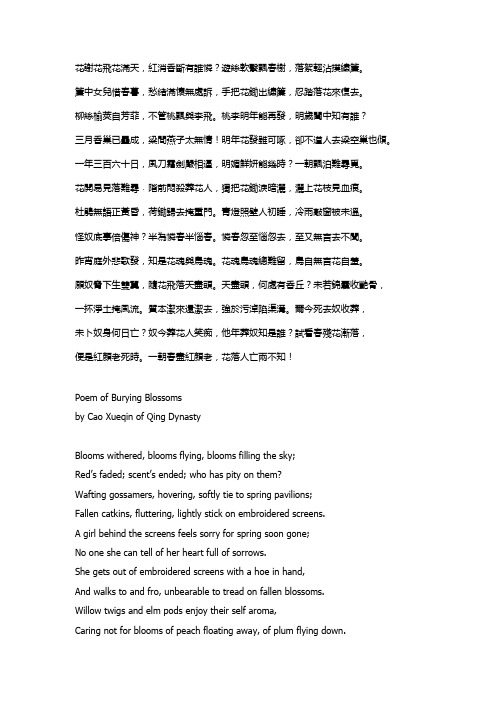
花謝花飛花滿天,紅消香斷有誰憐?遊絲軟繫飄春榭,落絮輕沾撲繡簾。
簾中女兒惜春暮,愁緒滿懷無處訴,手把花鋤出繡簾,忍踏落花來復去。
柳絲榆莢自芳菲,不管桃飄與李飛。
桃李明年能再發,明歲閨中知有誰?三月香巢已壘成,梁間燕子太無情!明年花發雖可啄,卻不道人去梁空巢也傾。
一年三百六十日,風刀霜劍嚴相逼,明媚鮮妍能幾時?一朝飄泊難尋覓。
花開易見落難尋﹐階前悶殺葬花人,獨把花鋤淚暗灑,灑上花枝見血痕。
杜鵑無語正黃昏,荷鋤歸去掩重門。
青燈照壁人初睡,冷雨敲窗被未溫。
怪奴底事倍傷神?半為憐春半惱春。
憐春忽至惱忽去,至又無言去不聞。
昨宵庭外悲歌發,知是花魂與鳥魂。
花魂鳥魂總難留,鳥自無言花自羞。
願奴脅下生雙翼,隨花飛落天盡頭。
天盡頭,何處有香丘?未若錦囊收艷骨,一抔淨土掩風流。
質本潔來還潔去,強於污淖陷渠溝。
爾今死去奴收葬,未卜奴身何日亡?奴今葬花人笑痴,他年葬奴知是誰?試看春殘花漸落,便是紅顏老死時。
一朝春盡紅顏老,花落人亡兩不知!Poem of Burying Blossomsby Cao Xueqin of Qing DynastyBlooms withered, blooms flying, blooms filling the sky;Red’s faded; scent’s ended; who has pity on them?Wafting gossamers, hovering, softly tie to spring pavilions;Fallen catkins, fluttering, lightly stick on embroidered screens.A girl behind the screens feels sorry for spring soon gone;No one she can tell of her heart full of sorrows.She gets out of embroidered screens with a hoe in hand,And walks to and fro, unbearable to tread on fallen blossoms.Willow twigs and elm pods enjoy their self aroma,Caring not for blooms of peach floating away, of plum flying down.Blossoms of peach and plum can blow afresh next year;But next year, who will be in the boudoir?The building of scented nests finished in March;But the swallows on beams are so merciless.Albeit they can peck blossoms blowing next year,Yet, unawares, the person’s gone, the empty nests on beams leaning. There are three hundred sixty days in a year;The knifelike wind and the swordlike frost press so hard;How long can flowers remain so beautiful and fresh?Once they float down, nowhere to look for.Flowers in bloom are easy to see, but hard to find, once fallen.The one on steps who will bury flowers is now feeling sulky,And holding the hoe alone, tears trickling stealthily.Tears splash on boughs that show the trace of blood.’Tis twilight, and the cuckoo is silent;Shouldering the hoe, I return and shut door after door.I just fall asleep with the lamp shining on the walls,And cold rains pelting on the window, quilts not warm yet.I wonder why I’m so doubly unhappy.It’s half pitying spring, half annoyed at spring.Pitying spring for its sudden coming, annoyed for its sudden going; It’s silent when coming, and no one knows when it’s going. Yesterday evening in the courtyard, a melancholy song was heard; So I know it’s souls of flowers and of birds.The souls of flowers and birds can’t always stay;Birds keep silent and flowers so shy.I wish to grow two wings under my armpits,And follow the flowers flying to the end of heaven.At the end of heaven, where’s the aromatic tomb?I’d rather gather beautiful bones in a brocade bag,And cover the beauty with a handful of pure earth.Since born in purity, now gone in purity,Better than buried in a dirty ditch.As you died now, I gather and bury you;I don’t know on which day I’ll pass away.People laugh at me as idiot for burying flowers;But who will bury me in years to come?Lo, flowers gradually drop in late spring;It’s time for young beauty to grow old and die.Once spring’s at the end, the beauty becomes old;Then none remember fallen flowers and the deceased.精彩推荐:商务英语学习/study-business.html。
葬花吟英文赏析

葬花吟英文赏析《葬花吟》是清代文学家曹雪芹的小说《红楼梦》中女主人公林黛玉吟诵的一首诗。
这首诗通过描绘花儿的凋谢,表达了林黛玉对自身命运的无奈和感叹。
以下是对这首诗的英文赏析:"The Dirge of Flowers" is a poem recited by the female protagonist Lin Daiyu in the novel "Dream of the Red Mansions" written by the Qing Dynasty writer Cao Xueqin. This poem depicts the withering of flowers and expresses Lin Daiyu's helplessness and sigh over her own fate.The poem opens with a description of the soft strings of a spring pavilion and the light touch of cotton-wool on embroidered curtains. This image immediately sets the scene for a poignant tale of a girl's deep feelings of springtime regret."The daughter of the boudoir grieves over the passing of spring, her melancholy heart unable to find release." The first lines are profoundly poignant, as they capture the essence of a girl's heartache over the fleeting beauty of spring. Her solitude andsadness are further emphasized as she "holds the flower hoe in her hand, stepping out of the embroidered curtain, braving the fallen flowers to come and go."The imagery in this section is particularly haunting, as it paints a picture of a girl standing alone, tears streaming down her face as she tenderly tends to the flowers that have begun to wilt. The blood-like stains on the empty branches are a powerful symbol of her emotional anguish.The poem's tone becomes increasingly desolate as it progresses. "The cuckoo was silent at dusk, and she returned with the hoe, closing the heavy door." The cold light of the oil lamp reflects off the white walls, and the icy rain beats against the unheated bedding. The stark loneliness and desolation that surrounds her is a stark contrast to the vibrant life that she once knew.The question "Why do I grieve so deeply?" expresses her tormented thoughts, her emotional upheaval stemming from both her love for spring and her loathing for its inevitable departure. Her deep longing for a time when happiness was hers, and her despair at its loss, arepoignantly expressed through the symbolism of flowers. "The flower and bird spirits cannot be retained, as the birds remain silent and the flowers shrink in shame." She prays that she might be given wings to follow the flowers as they scatter in the wind, far away from this world.However, she knows that even in the boundless sky, there is no resting place for flowers that have lost their way. It is not better to be collected in a brocade purse and hidden from sight, for that would still be a fate worse than death. Her final realization is one of profound sadness; that in a world where flowers cannot find their way, neither can she.The poem's final lines are perhaps its most powerful. "If I had my way, I would rise and float with the flowers, far away from this world." This line sums up her unwavering spirit, her refusal to submit to a fate that does not allow her to be who she truly is. She is not resigned to a life where her spirit is suffocated and her dreams are shattered. Her refusal to accept this fate is a testament to her unwavering will and determination."Dirge of Flowers" is more than just a poem about flowers; it is a profound exploration of human emotion and longing. It is a heartfelt cry from one who has seen what happiness once was and now faces a future that seems bleak and devoid of hope. It is a refusal to accept a world that does not value the individual, a world that does not see the beauty and worth in each unique soul. It is a testament to the resilience of the human spirit in the face of seemingly insurmountable obstacles.。
葬花吟英文翻译
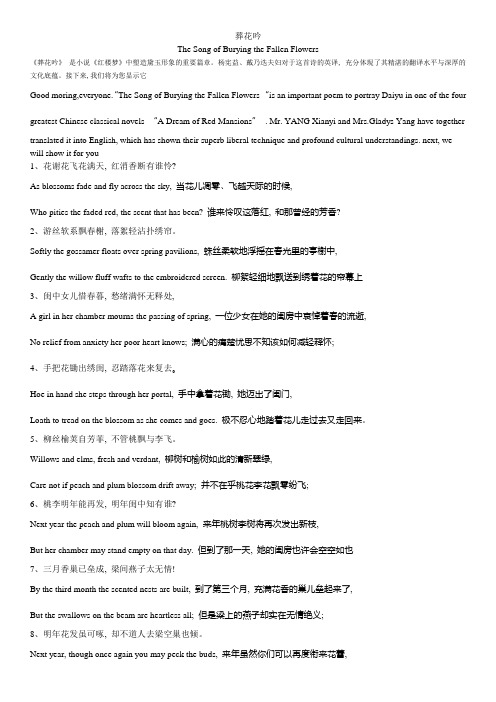
葬花吟The Song of Burying the Fallen Flowers《葬花吟》是小说《红楼梦》中塑造黛玉形象的重要篇章。
杨宪益、戴乃迭夫妇对于这首诗的英译, 充分体现了其精湛的翻译水平与深厚的文化底蕴。
接下来,我们将为您显示它Good moring,everyone.“The Song of Burying the Fallen Flowers “is an important poem to portray Daiyu in one of the four greatest Chinese classical novels “A Dream of Red Mansions”. Mr. YANG Xianyi and Mrs.Gladys Yang have togethertranslated it into English, which has shown their superb liberal technique and profound cultural understandings. next, we will show it for you1、花谢花飞花满天, 红消香断有谁怜?As blossoms fade and fly across the sky, 当花儿凋零、飞越天际的时候,Who pities the faded red, the scent that has been? 谁来怜叹这落红, 和那曾经的芳香?2、游丝软系飘春榭, 落絮轻沾扑绣帘。
Softly the gossamer floats over spring pavilions, 蛛丝柔软地浮摇在春光里的亭榭中,Gently the willow fluff wafts to the embroidered screen. 柳絮轻细地飘送到绣着花的帘幕上3、闺中女儿惜春暮, 愁绪满怀无释处,A girl in her chamber mourns the passing of spring, 一位少女在她的闺房中哀悼着春的流逝,No relief from anxiety her poor heart knows; 满心的痛楚忧思不知该如何减轻释怀;4、手把花锄出绣闺, 忍踏落花来复去。
高三英语阅读素材 Song of the Burial of Flowers葬花吟
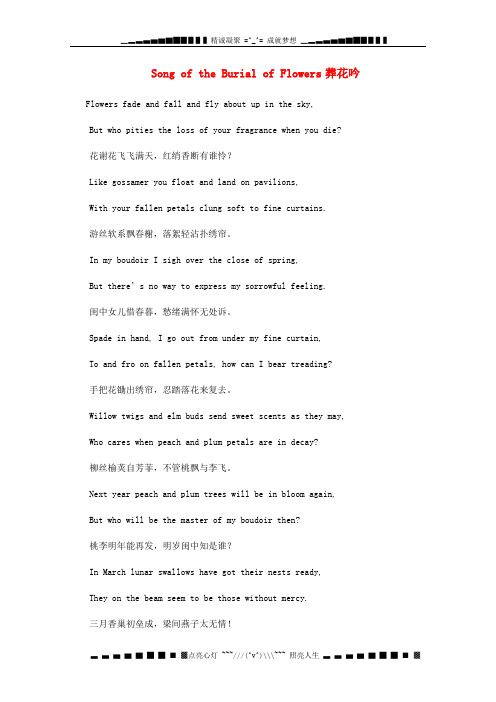
Song of the Burial of Flowers葬花吟Flowers fade and fall and fly about up in the sky,But who pities the loss of your fragrance when you die?花谢花飞飞满天,红绡香断有谁怜?Like gossamer you float and land on pavilions,With your fallen petals clung soft to fine curtains.游丝软系飘春榭,落絮轻沾扑绣帘。
In my boudoir I sigh over the close of spring,But there’s no way to express my sorrowful feeling.闺中女儿惜春暮,愁绪满怀无处诉。
Spade in hand, I go out from under my fine curtain,To and fro on fallen petals, how can I bear treading?手把花锄出绣帘,忍踏落花来复去。
Willow twigs and elm buds send sweet scents as they may, Who cares when peach and plum petals are in decay?柳丝榆荚自芳菲,不管桃飘与李飞。
Next year peach and plum trees will be in bloom again,But who will be the master of my boudoir then?桃李明年能再发,明岁闺中知是谁?In March lunar swallows have got their nests ready,They on the beam seem to be those without mercy.三月香巢初垒成,梁间燕子太无情!Next year in their flight, fresh flowers they may peck, though, All that they and I have will be lost, they never know.明年花发虽可啄,却不道人去梁空巢也倾!There are three hundred and sixty days in one year,With you the elements of nature are severe.一年三百六十日,风刀霜剑严相逼。
汉译英名篇:《葬花吟》及曹雪芹英文简介2

The poet and the background note:Cao Xueqin (? ~1764) was one of the most famous novelists and poets in the history of Chinese literature. Born in an influential Manchurian bureaucratic family, he had high cultural accomplishments and outstanding competence for art. During the reign of the Qing Emperor Yongzheng, his father was involved in a political struggle within the ruling class, defeated, so his family suffered a heavy blow both politically and financially. Thereafter, his family circumstances deteriorated. However, adversity brought talent in return. It was when he was plunged in such an embarrassing circumstance that he had the chance to contact himself with the underprivileged of the then society, thus giving him specific, intense experience, and enabling himself to see better of life.He spent as was recorded, at least ten years busying himself with the production of the novel The Dream of the Red Chamber, in which, through a detailed description of the rise and fall of an influential noble family of that time, he created a great number of typical characters, conducted in-depth analyses and criticisms of the then evil society and, at the same time, sang ebullient praises of both the male and female youths who were considered heretical in pursuit of love.The Dream of the Red Chamber is seen as a great realistic masterpiece among the Chinese classic novels. But the novel reveals a kind of pessimism and sentimentalism past cure. With the tone of Lin Daiyu, one of the heroines in The Dream of the Red Chamber, the author Cao Xueqin blended human feelings with nature in this novel as if in confirmation of man’s helplessness in the presence of the change of nature and the flight of time.As is known to all that have read it, Lin is a sentimentalist who, taking as part of her life the enjoyment of flowers and moonlight, tends to shed tears at the sight of flowers falling, and feel sad when finding the moon waning. In fact, Flowers bloom and then flowers die, There’s no need for her to give a sigh. It is the very law of nature, she ought not to take pains to bother. Relentless away time flies, over the natural loss she cries. She was born frail and tender, or because she’s a teenager.The author intended his novel to be a tragedy, around the theme of which he spread all the plots in it. Here, in this poem he had his heroine Lin utter his aspirations to achieve the artistic effect.。
《葬花吟》三个英译本比较研究
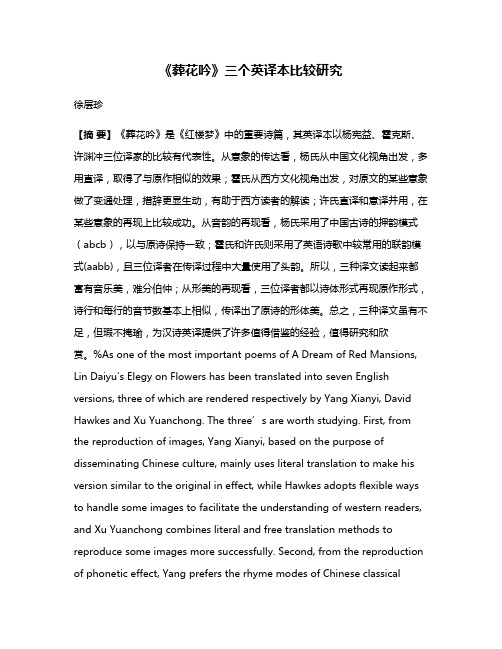
《葬花吟》三个英译本比较研究徐层珍【摘要】《葬花吟》是《红楼梦》中的重要诗篇,其英译本以杨宪益、霍克斯、许渊冲三位译家的比较有代表性。
从意象的传达看,杨氏从中国文化视角出发,多用直译,取得了与原作相似的效果;霍氏从西方文化视角出发,对原文的某些意象做了变通处理,措辞更显生动,有助于西方读者的解读;许氏直译和意译并用,在某些意象的再现上比较成功。
从音韵的再现看,杨氏采用了中国古诗的押韵模式(abcb),以与原诗保持一致;霍氏和许氏则采用了英语诗歌中较常用的联韵模式(aabb),且三位译者在传译过程中大量使用了头韵。
所以,三种译文读起来都富有音乐美,难分伯仲;从形美的再现看,三位译者都以诗体形式再现原作形式,诗行和每行的音节数基本上相似,传译出了原诗的形体美。
总之,三种译文虽有不足,但瑕不掩瑜,为汉诗英译提供了许多值得借鉴的经验,值得研究和欣赏。
%As one of the most important poems of A Dream of Red Mansions, Lin Daiyu's Elegy on Flowers has been translated into seven English versions, three of which are rendered respectively by Yang Xianyi, David Hawkes and Xu Yuanchong. The three’s are worth studying. First, from the reproduction of images, Yang Xianyi, based on the purpose of disseminating Chinese culture, mainly uses literal translation to make his version similar to the original in effect, while Hawkes adopts flexible ways to handle some images to facilitate the understanding of western readers, and Xu Yuanchong combines literal and free translation methods to reproduce some images more successfully. Second, from the reproduction of phonetic effect, Yang prefers the rhyme modes of Chinese classicalpoetry (abcb) to try to keep consistent with the original works, and Hawkes and Xu Yuanchong choose the most common rhyme form of English poetry (aabb). Besides, these three translators all use lots of alliteration, so their versions are full of musical beauty equally. Third, from the reproduction of poetic form, three translators all adopt the poetic form, trying to maintain roughly the same numbers of lines and the foot of each line, so their versions reproduce the form beauty of the original works. In a word, in spite of some flaws, three versions offer many useful techniques and approaches in translating Chinese poetry into English, which are worthy of note and appreciation.【期刊名称】《深圳信息职业技术学院学报》【年(卷),期】2014(000)004【总页数】7页(P94-100)【关键词】葬花吟;诗词翻译;“三美”理论【作者】徐层珍【作者单位】深圳信息职业技术学院应用外语学院,广东深圳 518172【正文语种】中文【中图分类】H315.9《红楼梦》是中国文学史上一部经典传世之作。
《葬花吟》七种英译本“炼字”探究
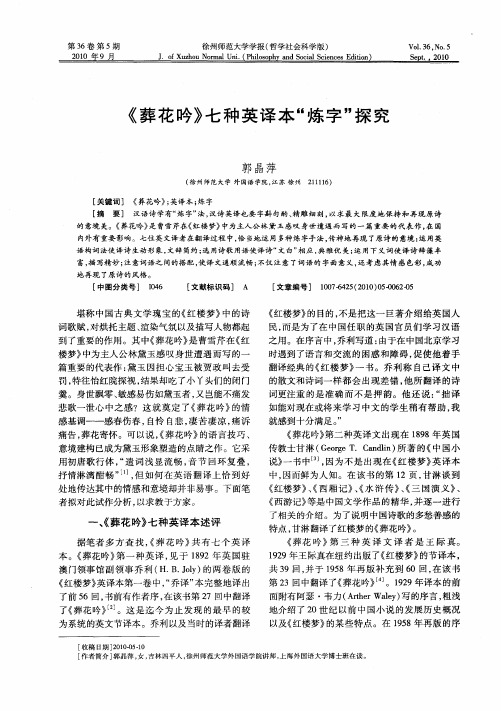
痛告 , 葬花寄怀 。可以说 , 葬花吟》 《 的语言技巧、
意境 建构 已成 为黛 玉形象 塑造 的点 睛之 作 。它采
用初 唐歌 行 体 , 遣 词 浅 显 流 畅 , 节 回环 复 叠 , “ 音 抒情 淋漓 酣 畅 ”l, 如何 在英 语 翻 译 上 恰 到 好 _ 但 J
处地传达其中的情感 和意境却并非易事 。下面笔 者 拟对此 试作 分析 , 以求 教 于方家 。
感基 调—— 感 春伤 春 , 自怜 自悲 , 苦 凄 凉 , 诉 凄 痛
如 能对 现在 或将 来 学 习 中文 的学 生 稍有 帮 助 , 我 就 感到 十分 满足 。 ” 《 葬花 吟》 第二 种 英译 文 出现在 19 英 国 88年 传 教士 甘 淋 ( ereT adi) 著 的 《 国小 G og .C nl 所 n 中 说》 一书中 , J因为不是出现在《 红楼梦》 英译本 中, 因而鲜为 人 知 。在 该 书 的第 1 2页 , 甘淋 谈 到
《 花 吟》 种英 译 本 “ 字 " 究 葬 七 炼 探
郭 晶 萍
( 徐州师范大学 外 国语学院 , 江苏 徐 州 2 11 ) 1 16
[ 关键词 ] 《 葬花吟》 英译本 ; ; 炼字 [ 摘 要 ] 汉语诗 学有 “ 炼字” , 法 汉诗 英译也要 字斟 句酌、 雕细刻 , 精 以求 最大 限度 地保持 和再现原诗
《 楼梦 》 红 英译 本第 一卷 中 ,乔译 ” 完整 地译 出 “ 本 了前 5 6回 , 书前有 作者 序 , 该 书第 2 在 7回中翻译 了《 花 吟》 。这 是 迄 今 为 止 发 现 的最 早 的较 葬 j 为 系统 的英 文节译 本 。乔利 以及 当时 的译者 翻译
第2 3回中翻译了《 葬花吟》 。12 年译本的前 J 99
从《葬花吟》两英译本中对比谈归化与异化

从《葬花吟》两英译本中对比谈“异化”与“归化”On Domestication and Foreignization by a Contrastive Study of the Two Well-knownVersions of Zang Hua Yin摘要:《葬花吟》是《红楼梦》中林黛玉的诗歌代表作。
它因其精湛且高超的艺术价值为许多文人所挖掘和探讨。
杨宪益和霍克斯的《葬花吟》英译本在翻译界最负盛名,这两个译本迥异的翻译策略常常被用来对比研究。
本文运用异化与归化的理论对杨宪益与戴乃迭夫妇、大卫·霍克斯《葬花吟》两种英译文进行比读和赏析,指出不论是归化还是异化,在目的语文化中起着不同的作用,都有其存在的价值。
在翻译过程中,需要根据不同的读者以及文化环境来选择适当的翻译策略。
关键词:《葬花吟》;杨宪益;霍克斯;归化与异化Abstract: Zang Hua Yin, the masterpiece of Lin Daiyu in A Dream of Red Mansions (Yang’S Version), has been researched and probed by many scholars for its consummate crafts and superb artistic values. Yang Xianyi and David Hawkes’translation versions of Zang Hua Yin, superior toall others, are often contrastively studied on their different translation strategies. This article aimsto employ“the domestication and foreignization Theory”to undertake contrastive reading and appreciation of two Zang Hua Yin versions respectively by Yang Xianyi and David Hawks.It suggests that domestication and alienation play different role in target language culture. In translation, appropriate translation methods should be chosen regarding to different readers and cultural environment.Keywords: Zang Hua Yin; Yang xianyi; David Hawkes; domestication; foreignization引言:经典小说《红楼梦》是我国文学史上一座闪烁智慧与灵性之光的魁宝,它的文学价值至今仍广受全世界的瞻仰。
林黛玉《葬花吟》三个英译本之比较

林黛玉《葬花吟》三个英译本之比较周美玲【摘要】"冷月葬花魂",《红楼梦》中《葬花吟》一诗对整部小说意义不言而喻,关于它的英译较常见有三个版本,即杨宪益、戴乃迭译本,大卫· 霍克斯译本和许渊冲译本,由于文化背景与语言环境的不同,三个译本呈现出不同的面貌.本文拟从词句、文化等方面分析三者的不同及其原因.【期刊名称】《东莞理工学院学报》【年(卷),期】2017(024)006【总页数】5页(P69-73)【关键词】《葬花吟》;杨宪益;戴乃迭;大卫·霍克斯;许渊冲【作者】周美玲【作者单位】上海辞书出版社,上海 200040【正文语种】中文【中图分类】I207.411《红楼梦》作为中国古典小说的最高典范,19世纪上半叶以来就陆续有不同版本的节译或全译本。
《葬花吟》作为最能代表其诗词造诣的一首诗,暗示了女主人公“花落人亡”的命运和贾府“大厦将倾”的结局,明义就曾评价此诗是“伤心一首葬花吟,似谶成真自不知”[1]。
在诸多译本中,最为著名的有杨宪益、戴乃迭译本(以下简称“杨戴译本”),大卫·霍克斯(David Hawkes)译本(以下简称“霍译本”)和许渊冲译本(以下简称“许译本”)。
这三个译本对不同的问题采取了不同的处理方式。
杨戴译本与霍译本都采用与原诗一致的视角,许译本却与之不同。
《葬花吟》的人称是由第三人称转为第一人称,即叙事学中由“零聚焦”转向“内聚焦”。
之所以这样安排,是因为诗歌的前半部分到“冷雨敲窗被未温”[2]以描述诗人的行踪和所见的自然之景为主,情绪虽蕴藏在景物中,但还不是十分强烈,这是情绪的蓄积过程。
后半部分以“怪侬底事倍伤神”[2]的发问开启了黛玉心灵的大堤。
这句设问使转变的过程极为自然,其后诗句都是黛玉对自己心理的描写。
情绪累积到最后“侬今葬花人笑痴,他年葬侬知是谁?”“一朝春尽红颜老,花落人亡两不知”[2]达到高潮。
这样的安排使读者在前半部分对人物的观察是有距离的,从带有主观情感的客观世界的描写中,让读者感受黛玉的感情,同时也是读者情感蓄积的过程。
“三美论”:《葬花吟》两个英译本赏析

“三美论”:《葬花吟》两个英译本赏析作者:杨琼来源:《青年文学家》2013年第14期摘要:诗歌是文化的载体,是一种高级的艺术形式,长期以来,诗歌的译入与译出层出不穷,然而诗歌翻译是文学翻译中难度最大的。
本文以许渊冲先生的“三美论”为理论指导,对《红楼梦》中的诗词《葬花吟》的三个英译本加以简单分析。
关键词:诗歌;翻译;三美论;葬花吟作者简介:杨琼,女(1989.3.1-),籍贯:河南郑州,单位:西安外国语大学,2011级外国语言学及应用语言学专业。
研究方向:翻译与翻译理论。
[中图分类号]:H059 [文献标识码]:A[文章编号]:1002-213(2013)-14--011、引言《红楼梦》中一百多篇诗词里,《葬花吟》可谓最经典的一首。
本文选取了杨宪益、戴乃迭和霍克斯的译本进行比较,并简单分析了许渊冲先生的译本。
杨戴译1版文更加注重对原文的忠实再现,更多地采用直译的手法;霍克斯的译本则在用词上有增有减,更偏重于意译手法的使用;而许渊冲的译本则从意美、音美和形美三个方面入手,旨在呈现给读者一种美的享受。
诗歌与其他的文学形式最大的不同在于,它是用来吟唱的,强调节奏感,要朗朗上口,自然流露强烈的真情实感。
关于诗歌翻译的标准,可谓仁者见仁,智者见智。
目前国内译界比较推崇的翻译思路莫过于许渊冲先生提出的“三美”原则,即音美,形美,意美,其实这也是诗歌本身就具有的特质。
本文将从“三美”原则出发,对以上提出的三个译本加以对比浅析。
2、《葬花吟》三个英译本浅析及对比许渊冲先生是我国著名的翻译家及翻译理论家,享有“译林奇才”的美誉。
许先生在实践上和理论上都为我国翻译事业做出了巨大的贡献。
他所提出的“三美论”更是令广大翻译学习者受益匪浅。
杨宪益与戴乃迭所译的红楼梦可谓是中西文化的合璧,译作中大多采用直译的方法,表达准确直观。
霍克斯的译作也是广为流传的一部,其中意译的痕迹更多一些。
接下来就着重依据三美理论对三个译作中的音美,形美,意美加以分别浅析及对比。
葬花吟英文赏析

葬花吟英文赏析【提纲】1.介绍《葬花吟》的背景和作者《葬花吟》是清代著名作家曹雪芹所著《红楼梦》中的一首诗。
这首诗由女主角林黛玉吟诵,描述了她对生命、爱情和命运的感慨。
林黛玉在小说中是一个极具才情但又命运多舛的女子,这首诗表达了她内心的无奈和悲痛。
2.分析《葬花吟》的英文翻译《葬花吟》的英文翻译为"The Lament of Flower Burial"。
这里,“葬”字翻译为"burial",准确地传达了花葬的含义;"花"翻译为"flower",既体现了诗的主题,又保持了原文的形象;"吟"字则用"lament"来表达,传达了诗人的感慨之情。
3.赏析《葬花吟》的英文表达手法和优点首先,这首诗的英文翻译在词汇选择上非常到位,如“泪眼问花花不语,乱红飞过秋千去”翻译为"Tears rolling down her eyes, she asks the flowers, but they remain silent.The scattered red petals fly away like autumn swings." 这句话生动地描绘了林黛玉葬花时的悲伤景象,英文表达也富有诗意。
其次,翻译者在表达诗的意境时,采用了意译的方式,如“花开堪折直须折,莫待无花空折枝”翻译为"When flowers bloom, pluck them; don"t wait until there are no flowers left to pick on the branches." 这样的表达既保留了原文的意义,又让英文读者能够感受到诗中的寓意。
最后,这首诗的英文翻译在句式和语法上处理得当,如“花谢花飞花满天,红消香断有谁怜?”翻译为"Flowers wither and fall, filling the sky with their decay.Who will pity the redness gone and the fragrance vanished?" 这句话在英文中流畅自然,体现了译者的语言功底。
从“三美论”看《葬花吟》的七种英译本

作者: 郭晶萍 作者机构: 徐州师范大学外国语学院,江苏徐州211116 出版物刊名: 南京工业大学学报:社会科学版 页码: 92-96页 年卷期: 2010年 第3期 主题词: �葬花吟》 英译本 “三美”
Hale Waihona Puke 摘要:�葬花吟》是曹雪芹在《红楼梦》中为主人公林黛玉感叹身世遭遇而写的一篇重要的 代表作,以其绚丽的意象、悲愤的格调、优美的文辞、铿锵的音韵传唱至今。七位英文译者在 翻译过程中,再现了原诗的意美、音美、形美:注意咬文嚼字,译出了原诗的意境;注意译诗 中韵的运用,再现了原诗的音美;注意使用跨行手法,转存了原诗的形关。
- 1、下载文档前请自行甄别文档内容的完整性,平台不提供额外的编辑、内容补充、找答案等附加服务。
- 2、"仅部分预览"的文档,不可在线预览部分如存在完整性等问题,可反馈申请退款(可完整预览的文档不适用该条件!)。
- 3、如文档侵犯您的权益,请联系客服反馈,我们会尽快为您处理(人工客服工作时间:9:00-18:30)。
葬花吟David HawksThe blossoms fade and falling fill the air,Of fragrance and bright hues bereft and bare.Floss drifts and flutters round the Maiden`s bower,Or softly strikes against her curtained door.The Maid ,grieved by these signs of spring`s decease, Seeking some means her sorrow to express,Has rake in hand into the garden gone,Before the fallen flowers are trampled on.Elm-pods and willow-floss are fragrant too;Why care,Maid,where the fallen flowers blew?Next year ,when peach and plum-tree bloom again, Which of your sweet companions will remain?This spring the heartless swallow built his nest Beneath the eaves of mud with flowers compressed. Next year the flowers will blossom as before,But swallow ,nest ,and Maid will be no more.Three hundred and three-score the year`s full tale: From swords of frost and from the slaughtering gale How can the lovely flowers long stay intact,Or, once loosed,from their drifting fate draw back?Blooming so steadfast ,fallen so hard to find! Beside the flowers`grave,with sorrowing mind, The solitary Maid sheds many a tear,Which on the boughs as bloody drops appear. At twilight ,when the cuckoo sings no more, The Maiden with her rake goes in at doorAnd lays her down between the lamplit walls, While a chill rain against the window falls.I know not why my heart`s so strangely sad, Half grieving for the spring and yet half glad: Glad that it came ,grieved it so soon was spent.So soft it came ,so silently it went!Last night ,outside ,a mournful sound was heard: The spirits of the flowers and of the bird.But neither bird nor flowers would long delay, Bird lacking speech,and flowers too shy to stay. And then I wished that I had wings to flyAfter the drifting flowers across the sky:Across the sky to the world`s farthest end,The flowers` last fragrant resting-place to find. But better their remains in silk to layAnd bury underneath the wholesome clay,Pure substances the pure earth to enrich,Than leave to soak and stink in some foul ditch. Can I,that these flowers` obsequies attend,Divine how soon or late my life will end?Let others laugh flower-burial to see:Another year who will be burying me?As petals drop and spring begins to fail,The bloom of youth,too,sickens and turns pale. One day,when spring has gone and youth has fled. The Maiden and the flowers will both be dead.杨宪益As blossoms fade and fly across the sky,Who pities the faded red, the scent that has been? Softly the gossamer floats over spring pavilions, Gently the willow fluff wafts to the embroidered screen.A girl in her chamber mourns the passing of spring, No relief from anxiety her poor heart knows;Hoe in hand she steps through her portal,Loath to tread on the blossom as she comes and goes. Willows and elms, fresh and verdant,Care not if peach and plum blossom drift away;But her chamber may stand empty on that day.By the third month the scented nests are built,But the swallows on the beam are heartless all;From the beam of an empty room your nest will fall. Each year for three hundred and sixty daysHow long can beauty flower fresh and fair?Fallen, the brightest blooms are hard to find;With aching heart their grave-digger comes nowAlone, her hoe in hand, her secret tearsFalling like drops of blood on each bare bough. Dusk falls and the cuckoo is silent;Her hoe brought back, the lodge is locked and still;A green lamp lights the wall as sleep enfolds her, Cold rain pelts the casement and her quilt is chill. What causes my two-fold anguish?Love for spring and resentment of spring;For suddenly it comes and suddenly goes,Its arrival unheralded, noiseless its departing. Last night from the courtyard floated a sad song-- Was it the soul of blossom, the soul of birds, Hard to detain, the soul of blossom or birds?For blossoms have no assurance, birds no words.I long to take wing and flyWith the flowers to earth’s uttermost bound; And yet at earth’s uttermost boundWhere can a fragrant burial mound be found? Better shroud the fair petals in silkWith clean earth for their outer attire;For pure you came and pure shall you go,Not sinking into some foul ditch or mire.Now you are dead I come to bury you;Men laugh at my folly in burying fallen flowers,But who will bury me when dead I lie?See, when spring draws to a close and flowers fall,This is the season when beauty must ebb and fade; The day that spring takes wing and beauty fadesWho will care for the fallen blossom or dead maid?许渊冲译文As flowers fall and fly across the skies,Who rues the red that fades, the scent that dies? Softly the gossamer floats over bowers green; Gently the willow fluff wafts to broidered screen.In my chamber I’m grieved to see spring depart. Where can I pour out my sorrow-laden heart?I step out of my portal with a hoe.On fallen petals could I come and go?Willow threads and elms leaves are fresh and gay; They care not if peach and plum blossom drift away. The peach and plum will bloom next year.But my chamber who will then appear?By the third moon the swallows built their nest,But apathetically on the beam they rest.Next year though they may peck the buds again,O in my empty chamber can their nest remain?For three hundred and sixty days each year,The cutting wind and biting frost make flowers sear. How long can they blossom fresh and fair?Once blown away, they cannot be found anywhere. Their gravedigger, I find no flowers in bloom;My aching heart is further filled with gloom.With hoe in hand, tears secretly shedLike drops of blood turn bare branches red.As twilight falls, the cuckoos sing no more;I come back with my hoe and close the door.Abed in dim-lit room when night is still,I hear cold rain and my quilt feels damp and chill.I wonder why I’m thrown in such a fret:Is it for love of spring or for regret?I love it when it comes, regret it when it goes;But spring comes and goes mute as water flows. Last night from the courtyard a dirge was heard, Sung by the soul of flower and of bird.The bird’s and flower’s soul is hard to detain;The flowers blush and silent birds remain.I long on wings to flyWith the flowers to the end of the earth and sky.At earth’s uttermost bound,Where can I find a fragrant burial mound?Why don’t I shroud in silken bag the petals fairAnd bury them in the earth forever to mingle there? Pure they come and pure shall go,Not sinking to oblivion below.Now they are dead, I come to bury them today. Who can divine the date when I shall pass away? Men laugh at my folly in burying fallen flowers. But who will bury me when come my last hours? See spring depart and flowers wither by and by. This is the time when beauty must grow old and die. Once spring is gone and beauty dead, alas!Who will care for the fallen bloom and buried lass?。
